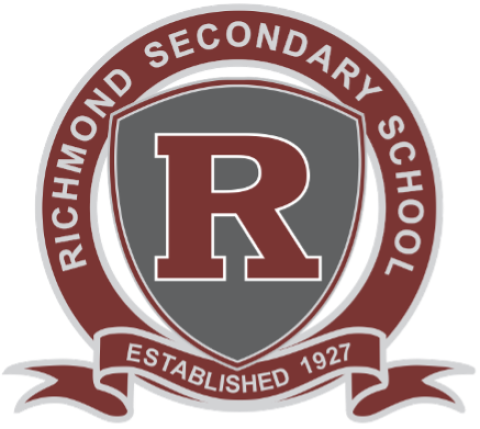Home Economics (ADST)

The Richmond Secondary School Home Economics courses fit under the Applied Design, Skills and Technologies curriculum.
Exposure to Home Economics courses is a tremendous advantage for all students. Home Economics education helps develop valuable life skills as students learn about health and nutrition, the safe handling and preparation of foods, and the creation of delicious meals and innovative textiles projects. Home Economics classes at Richmond Secondary School include courses in Culinary Arts, Foods and Nutrition, Textiles and Fashion Design.
APPLIED SKILLS 8: FOODS AND NUTRITION, TEXTILES and CARPENTRY
This rotating Grade 8 course introduces our youngest students to the basic concepts and skills through a rotation system comprised of Foods, Textiles and Carpentry. Foods and Nutrition 8 introduces students to basic food preparation and food handling skills. Safety and cooking lab procedures will be emphasized along with the planning and skills involved in creating a variety of easy-to-prepare, nutritious foods. Textiles 8 introduces students to various basic hand-sewing techniques and related sewing equipment and supplies. Students will use creative thinking and planning and learn the skills involved in designing and producing their own plushies. Carpentry 8 will introduce students to our professional wood shop and the important safety procedures as well as basic carpentry tools and skills they will use to plan and create several simple projects with wood and other materials. These introductory courses will allow students to try different courses, learn new skills and help them make informed decisions in their course selections in future years.
FOOD STUDIES
The Foods Program allows students to explore the preparation, usage and nutritional value of a wide variety of foods. Students will use what they learn in their daily lives now and in their future. The program provides students with an opportunity to work in cooperative groups and on their own to discover their own abilities and develop a curiosity to learn more. As well, students develop self-confidence, creativity, time management skills, and global awareness.
FOOD STUDIES Level 1
This course is for students in grades 9 – 12 who have completed Applied Skills 8 or those who have not taken Foods courses in high school. This course is designed to give students an overview of the many aspects of food preparation, nutrition, meal planning, and time management. Students will prepare a variety of foods including eggs, soups, pasta, desserts, etc. It is hoped that students will leave this course with an appreciation of simple food preparation and how integral it is to our lives.
FOOD STUDIES Level 2
This intermediate course is for students who have completed Food Studies Level 1. This course is designed to broaden the students' experiences in the planning and preparation of food. Students will prepare a variety of foods including yeast breads, protein foods, pasta, rice, and desserts. It is hoped that students will leave this course with an appreciation of how fascinating and rewarding food preparation can be and how integral it is to our lives.
FOOD STUDIES Level 3
This course is for students who have completed Foods Studies Level 2. This course is designed for students who want advanced knowledge in new techniques, meal planning, meal preparation, and nutrition. Special holiday labs will be incorporated at the teacher’s discretion. It is hoped that students will leave this course with an appreciation of how fascinating and rewarding food preparation can be and how integral it is to our lives.
CULINARY ARTS
Note - the dedicated Professional Cook Training Apprenticeship Program is a separate District program at Richmond Secondary School that runs on one full day (Day 2s) and requires a separate application process - please speak with your counsellor.
CULINARY ARTS 11
This course is open to Grades 10, 11 and 12 students. It is a basic introduction to a professional kitchen and the food industry. Students will work with commercial kitchen equipment and will work in teams to prepare snacks, lunch, food for special event catering and for the school population. Students get practical experience at various stations while studying safety, sanitation, knife skills, cooking methods, salads, sandwiches, baking, desserts, soups, stocks, sauces, short order, entrees, vegetables, starches, garnishes and service principles. The majority of work and assessment is based on kitchen work during class time. Students will complete Foodsafe Level 1, a Ministry of health sanitation program for food handlers. Outside of school hours catering may be required.
CULINARY ARTS 12
Recommended: students have completed Culinary Arts 11
Students will acquire the skills, knowledge and understanding of the principles of quantity food preparation and service in a commercial kitchen operation. Through hands-on experience students learn to function as an efficient member of a team in the preparation and service of breakfast, lunch and catering functions for the school and community. Students will practise leadership and personal management skills. CKT 12 students will take a leadership role in the kitchen and develop professional attitudes necessary for industry. Outside-of-school-hours catering will be required. Course of Studies: See CKT 11A and B above. In addition, students will develop more advances skills in food preparation.
TEXTILES
The Textiles Program introduces students to the many aspects of clothing and textile design. Students will learn essential hand-sewing and machine-sewing techniques and will select their own fabrics to create a variety of projects such as shirts, sweatshirts, dresses, pants, and accessories. Students may be required to supply some of their own fabric and notions for self-selected projects.
APPLIED SKILLS 8: TEXTILES
Please read the course description at the top of this section.
TEXTILES LEVEL 1 (INTRODUCTORY) 9-12
Students may begin this course in grades 9, 10, 11, or 12. Level 1 provides a strong foundation in sewing skills and garment construction. Students learn to work with commercial patterns and explore a range of construction techniques aimed at developing high-quality workmanship. Topics include hand-sewing, fabric and pattern selection, fitting, garment construction, fiber studies, and fabric care.
Students will complete three major projects: a tote bag, pajama pants, and a hoodie—each designed to build confidence and prepare them for independent sewing.
TEXTILES LEVEL 2 (INTERMEDIATE) 10 & 11
Level 2 should be taken only after completing Level 1. This course expands on fundamental skills by introducing more advanced principles of garment construction and pattern use. Students are expected to be comfortable with sewing machines and basic techniques. Course work includes three to four projects emphasizing quality workmanship, design, fit, and wardrobe planning (e.g., skirts or pants, jackets, blouses/shirt dresses, and specialty fabrics).
By the end of the course, students will be able to confidently select appropriate patterns and fabrics and apply construction skills with increasing independence.
TEXTILES LEVEL 3 (SENIOR) 11-12
Level 3 is intended for students who have successfully completed Levels 1 and 2. Students will explore advanced garment-construction methods and pattern alterations. Course work includes three to four projects focused on high-quality workmanship, design, fit, and wardrobe coordination. Students will also gain experience working with specialty fabrics and develop a foundational understanding of textile-related products.
TEXTILES LEVEL 4 (ADVANCED) 12
Level 4 is for students who have completed the first three levels of Textiles and are ready for advanced, self-directed learning. Designed for highly motivated students with a passion for fashion, this course requires strong sewing experience and the ability to independently use sewing machines and commercial patterns. Students will start by completing an upcycling project to channel their creativity before moving on to individualized projects that challenge their skills and introduce new techniques to broaden their knowledge of textiles and garment construction. This course is self-paced and driven by student interest and inquiry.
